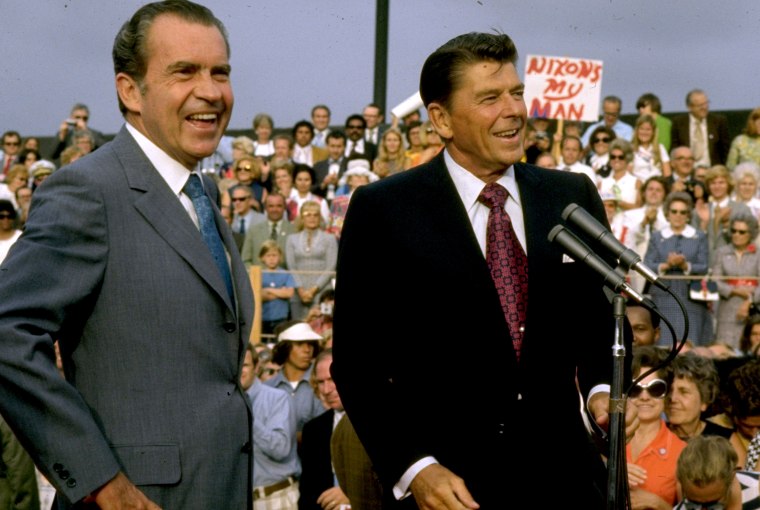Ronald Reagan, while serving as the governor of California, referred to United Nations delegates from an African country as “monkeys,” according to a newly-released recording of a phone call between him and then-President Richard Nixon in 1971.
The actor-turned-politician who would himself serve two terms as president beginning in 1981 was calling Nixon to gripe about a U.N. vote in October 1971 to recognize the People’s Republic of China as the only legitimate representative of China, seating a delegation from Beijing instead of from Taiwan.
When the U.N. took the vote the day before, members of the Tanzanian delegation, who had sided against the United States, began dancing in the General Assembly.
“Last night, I tell you, to watch that thing on television, as I did, to see those, those monkeys from those African countries — damn them — they’re still uncomfortable wearing shoes!” Reagan said on the call.
Nixon allowed a chuckle after Reagan uttered the word “monkeys,” but by the time Reagan was done with his thought, Nixon was laughing heartily. "Well, the tail wags the dog there, doesn't it? The tail wags the dog," Nixon responded.
The unredacted audio was released by the National Archives and the Richard Nixon Presidential Library and Museum earlier this month and revealed by Tim Naftali, who served as director of the library from 2007 to 2011, in The Atlantic on Tuesday.
Naftali wrote that when the National Archives first released the audio of the phone call between the two Republicans in 2000, “the racist portion was apparently withheld to protect Reagan’s privacy.”
NBC News reached out to the National Archives for comment on the delay in releasing this portion of the call and did not immediately hear back.
With Reagan’s death in 2004, the privacy concerns were eliminated, and Naftali requested last year that his conversations with Nixon be reviewed again. The National Archives released the full October 1971 conversation two weeks ago.
Other recordings reveal that Nixon proceeded to use Reagan’s comments as a sort of crutch to express the same thoughts without having the racist terminology come directly from him.
In a subsequent call to then-Secretary of State William P. Rogers, Nixon tells him it would be wise not to throw full support behind the U.N. He recounts the call with Reagan.
"As he said, he saw these uh, he said these uh ... these cannibals on television last night, and as he said, ‘Christ, they weren’t even wearing shoes,'" Nixon tells Rogers, who snickers quietly.
"And he said, 'here, the United States is going to submit its fate to that' and so forth and so on, and, and you know, but that’s typical of a reaction, which is probably quite strong," Nixon says.
Nixon calls Rogers again later and repeats the narrative of the phone call with Reagan as if he was telling it anew, adding his own flourishes.
Reagan "practically got sick at his stomach, and that’s why he called. And he said, ‘It was a terrible scene.’ And that that sort of thing will have an emotional effect on people … as he said, ‘This bunch of people who don’t even wear shoes yet, to be kicking the United States in the teeth,'" Nixon says.
Rogers agrees that the scene in the General Assembly was "repulsive." Neither had seen the televised images, both admit on the call.
"The president wanted his patrician secretary of state to understand that Reagan spoke for racist Americans, and they needed to be listened to," Naftali wrote in his article.
The conversations were not anomalous for Nixon, who resigned in 1974 amid impeachment proceedings following the Watergate scandal.
"We’re going to (place) more of these little Negro bastards on the welfare rolls at $2,400 a family,” Nixon once said about what he thought were inadequate work requirements for his welfare program, which eventually failed.
He also seemed fairly convinced that the theories of psychologists Richard Herrnstein and Arthur Jensen, which tied IQ to race, were true.
“I have reluctantly concluded, based at least on the evidence presently before me, and I don't base it on any scientific evidence, that what Herrnstein says, and what was said earlier by Jensen, is probably very close to the truth,” Nixon said during another call with Harvard professor Daniel Patrick Moynihan, audio of which is also public.
"I think the reason I have to know it is that as I go for (family assistance) programs, I must know that if they have basic weaknesses," Nixon said.
Naftali noted that Reagan and Nixon weren't the only presidents to espouse racist beliefs and make policy decisions based on those convictions.
"The past month has brought presidential racism back into the headlines," Naftali wrote. The 1971 exchange between Reagan and Nixon "is a reminder that other presidents have subscribed to the racist belief that Africans or African Americans are somehow inferior."
"The most novel aspect of President Donald Trump’s racist gibes isn’t that he said them, but that he said them in public," he wrote. "This president, unlike Nixon, doesn’t believe he needs to hide behind anyone else’s racism."
The Reagan Foundation did not respond to a request for comment on the Atlantic article's surfacing of the 1971 recording. On Tuesday, the foundation's Twitter page featured a photo of Reagan and Nixon touring the Reagan Library in 1993.
And on Wednesday morning, the Reagan Foundation tweeted a quote attributed to the 40th president: "We can preserve the dream of America … We need all our people, men and women, young and old, individuals of every race, to be happy, healthy, and whole. And that's what our job is all about.”


